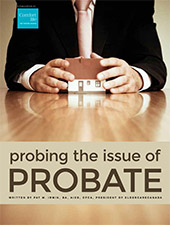What to know about this topic:
- Three exemplary case studies
- Advice from experts on how women can succeed
- Finding an expert who can help you
The magazine articles, brochures and ads feature slim, fashionable couples enjoying their senior years to the fullest. But are Canadian seniors really so perfectly paired up?
Three exemplary case studies
Most senior women are in one of these three situations:
Olive, 73, always worked and when she retired at 65, she was confident that her pension would make her ‘rich’—but low interest rates have not kept pace with the care costs she racked up after a recent broken hip. Her main concerns are outliving her assets and not having control over what happens to her living arrangements and funds, as she requires an increasing amount of care.
Marianne, 70, married her husband (a fellow teacher) late in life at age 50, but his alcoholism led to their divorce five years ago. Her divorce settlement, based on the sale of their home, went toward her small condo, with the remainder invested ‘in something or other, I’m not sure what.’ Marianne had always envisioned an active retirement, travelling with her husband. But now her ‘couple friends’ forget to include her, and travel plans have been scuppered by very poor investment returns.
Betty, 78, had a long and happy marriage; Ron was a very traditional man who made all the financial decisions and her nest egg mostly consists of their house. Betty realizes that Ron’s desire to protect her from any financial responsibility was actually a disservice. When he died, she had never written a cheque, changed a fuse or pumped gas, and had a lot to learn. She was also flooded with advice about selling the house, investing and even dating.
Advice from experts on how women can succeed
What do the experts say?
Paul Bourbonniere of Polson Bourbonniere would advise Olive to gather a cohesive support team who can work together to achieve her goals. He would remind Marianne to be sure her will has been updated to replace her ex-husband as beneficiary or executor, and would carefully review her investment portfolio to ensure it reflects her risk tolerance and objectives, which may differ from her ex-husband’s. He would do the same with Betty, being sure her late husband’s investment strategies were now reflecting her personal goals. He would review the options regarding her house with the same view toward risk tolerance, her stage of life, options for longer-term housing and potential care costs.
Mary Robertson of Living Life Cycles agrees that the top concern of senior women is the fear of outliving their assets; she adds that underestimating health care costs is a potential disaster to the very best-laid plans. She maintains a fee-based service is the only objective option for an unbiased plan and that people should expect to pay for good advice.
She urges senior women to become financially informed but warns against seminars that are actually sales pitches. Instead, she says, they should consult Service Canada’s retirement calculator, which guides the user through the funds available from public sources, then prompts for other income to derive a valid estimate of available income.

Another resource is Investopedia, a Canadian site offering articles, tutorials, calculators and other tools. Mary suggests using the Financial Planning Standards Council website to find a planner and help develop questions to ask when evaluating the best planner for your needs.
Mary finds that many of her senior female clients are asset-rich but income-poor. To help a client concerned about outliving her assets, she would thoroughly investigate all sources of income and develop a budget of projected costs, a spending plan and an investment strategy that maximizes tax savings. Future care costs can be offset by long-term care insurance, but shop carefully from an expert underwriter such as Sunlife or Manulife. Mary also suggests a variable annuity to provide income but also generate growth. She predicts an increase in new, creative products, driven by the demands of retiring Zoomers.
Jim Harvey, a CA and former CFO of an insurance company, was so amazed by the lack of financial knowledge demonstrated by even welleducated people, that he created Basic Financial Literacy, a seminar service to address the most essential principles (such as budgets, debt, investments, insurance, pensions and retirement) and economic basics (such as inflation and interest). He would ask these women: do you think that nice lady at the bank is giving you advice for free? Think again. She’s getting a commission from the product she sells to you. Get used to low interest rates—governments are more concerned about controlling inflation and encouraging more consumer debt. But, even a low return is better than having funds tied up in a major asset such as a house, if you need the income. Look at your pension. Is it a defined benefit plan? Is it indexed?
There is no reason why a senior woman, regardless of her marital status, needs to retire into poverty. Yes, women traditionally had less earning power and live longer; yes, relying on the government for a comfortable pension may be a fantasy. But you aren’t alone. Ask yourself some of our experts’ questions, check out the websites and gather your courage. Knowledge is power and it is available at all income levels. If you don’t take advantage of it, the only one who will lose out is you.
Finding an expert who can help you
Your prospective financial advisor may have received rave reviews from your friends, but before you make an appointment, be sure they are:
- Paid on a fee-for-service basis, not commissions based on what they sell
- Using a third-party custodian for investments (not their own coffers); cheques should be made payable to the investment firm, not the advisor
- Governed by the codes of their professional accrediting body, such as the Investment Industry Regulatory Organization of Canada or Mutual Fund Dealers Association
- Registered to provide advice and sell investments with the Canadian Securities Commission at www.canadiansecuritiescommission.com or the Ontario Securities Commission at www.osc.gov.on.ca
- Clear of any issues with regulators
If they are licensed to sell stocks, ETFs or other individual securities (over and above just mutual funds,) they are regulated by IIROC (Investment Industry Regulatory Organization of Canada) for disciplinary search or information requests.
If they are licensed to primarily sell mutual funds, they are regulated by the MFDA (Mutual Fund Dealers Association) to check for any disciplinary hearings.
And lastly, don’t forget your old friend, Google – just check them out online!




